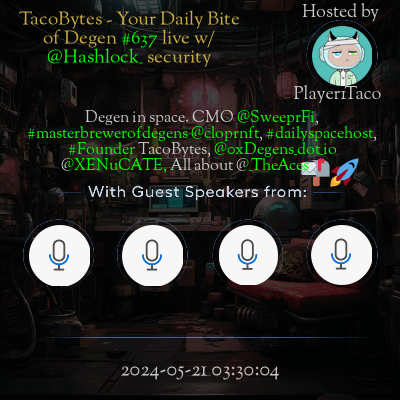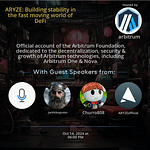This space is hosted by Player1Taco
Space Summary
The Twitter space titled "Taco Bites" presents episode 3637, broadcasting live from Rhode Island after a return from Poland. The space was strategically planned for two weeks, fostering an engaging environment for a diverse audience across platforms like LinkedIn, YouTube, and Twitch. The episode's setup demonstrates a commitment to engaging with viewers and expanding reach through various social media platforms. This episode caters to a niche category of "Unique Projects," offering a distinctive experience to the audience.
Questions
Q: What is the core focus of Hashlock?
A: Hashlock focuses on innovative DeFi solutions like mezzanine finance and liquid staking.
Q: Can you elaborate on mezzanine finance on-chain?
A: Mezzanine finance on-chain involves blending debt and equity financing in a blockchain setting.
Q: Which networks do Hashlock projects primarily operate on?
A: Most projects are within the Polkadot ecosystem, especially on the Astar Network.
Q: What is Algom and its primary operations?
A: Algom specializes in liquid staking and farming, operating on the Astar Network.
Q: What makes Astar Network significant?
A: Astar Network stands out for its integration into Polkadot and support for innovative projects like Algom.
Q: How does liquid staking function?
A: Liquid staking enables token holders to stake assets while retaining usability in other financial activities.
Q: What does the future of DeFi look like?
A: DeFi's future is bright with ongoing innovations and increased incorporation of real-world assets.
Q: How vital is community engagement for DeFi success?
A: Community engagement is crucial for building trust and fostering a supportive DeFi environment.
Q: What challenges do DeFi projects face in scalability?
A: DeFi projects need to address network congestion and ensure seamless interaction with other blockchains for scalability.
Q: Are there drawbacks to liquid farming?
A: While beneficial, liquid farming requires careful risk management to mitigate potential vulnerabilities in smart contracts.
Q: What role can on-chain finance models play in traditional finance?
A: On-chain finance models can disrupt traditional finance by offering transparency, efficiency, and reduced costs.
Q: What is the title of the episode?
A: The episode is titled "Taco Bites."
Q: Where is the live episode broadcasted from?
A: The live episode is broadcasted from Rhode Island.
Q: How long was the space planned ahead?
A: The space was planned for almost two weeks.
Q: Which platforms is the audience engaging from?
A: The audience is engaging from platforms like LinkedIn, YouTube, Twitch, and more.
Highlights
Time: 00:00:35
Introduction to Hashlock
Time: 00:01:15
Mezzanine Finance Insights
Time: 00:08:39
Liquid Staking Overview
Time: 00:09:30
Algom Project Introduction
Time: 00:12:45
Astar Network Importance
Time: 00:22:12
Community Engagement Strategies
Time: 00:34:50
Innovative DeFi Solutions
Time: 00:45:02
Q&A Session Commencement
Time: 00:56:14
Real Assets Integration
Time: 01:09:00
Scalability Challenges Addressed
Time: 01:17:23
Closing Remarks
Key Takeaways
- Episode 3637 of Taco Bites is live from Rhode Island after returning from Poland.
- The space was planned for almost two weeks
- creating an exciting atmosphere.
- The audience spans across multiple platforms like LinkedIn
- YouTube
- Twitch
- and more.
- Engaging with viewers on different social media platforms enhances the reach and interaction.
Behind the Mic
was like, okay, cool. But it's different areas, and so the same thing, you know, stateside, New York, you'll see more towards the finance and nfts. Miami, it's more like the NFTs and the shit coins. Texas, it's more like we're building a blockchain, you know? And then now everywhere, everyone's trying to bring AI into it, you know, and, oh, every. Every other firm is a market, either a payment processing or a marketing firm. In Poland, it seems like. Really? Yeah. Well, that's. That's interesting as well, because we are, like, heading to Texas for consensus next week. Yeah, well, actually, wait. End of this week is when we leave, I think, Fletch. So that's exciting. it'll be my first time in Texas, so I'm keen to eat some good barbecue and go to a bucky's. That's the two things on my list. Yeah. We can do so much better than that, but. Okay, we'll do that. We'll do that. What is a bucky's educating me. It's a gas station with a beaver. It's like a really big one with, like, they're. They're all pretty. They're all pretty big. Yeah, like. Yeah, like, with like a hundred petrol stations and one. Crazy. Yeah, it's. Yeah, it's pretty crazy. All right. You're setting the bar very low, so you're gonna have a blast. Awesome. Yeah, it's cool with what Warsaw is doing, because in Australia, like, some of the regulation people are still. I feel like the government and sort of government entities are still trying to figure it out. And maybe the australian public, at least the ones, you know, invested in this space, might say that maybe they get, like, a little bit too, like, hands on without knowing enough, I think one of the recent things. And shout out to Harry Dell, aka taxpappy eth, for sort of bringing this to our attention at one of the australian defi meetups. But essentially, I think the taxation authority in Australia wanted to have a thing where essentially every transaction that happened in a blockchain, sort of infrastructure transaction, so you could have one wallet and you're sending money from a wallet for, like, from one exchange to another to another wallet and within the one blockchain sort of. But it's all just you essentially in your assets, right. They wanted to count that as a taxable event every single time, even though there was like no liquidity from. From an outside source sort of involvement in that transaction. So I think Harry was telling us how essentially people were sort of pushing back about that because otherwise you're gonna get taxed on every single transaction and really eat up your capital unnecessarily. So that sort of pushback was happening. So I feel like Australia still sort of figuring that out. But, you know, countries like Poland and Australia as well, they've. They've done amazing stuff and visit. Wait, jock. It's probably a good opportunity. Who's. Some clients that we should. That we should shout out mes five. That's a good one. They're doing some. A bunch of cool stuff with, what do you call it? Mezzanine finance on chain. Okay. Which is quite interesting. So another real asset, one algem is another one of our clients. Al G E m. They do a bunch of liquid staking. They've got, obviously, their own token liquid staking. Liquid farming. What chain eth or mainnet or. They're on the a star network. Oh, a star. I love a star. But they're doing, they're serious players, to be honest, mark and co. And, and sort of, you know, their structure so different as well. They're essentially. They've got big buins, big backers, same as you guys where they operate a little bit more leaner, but they have a lot of funding and the talent in the market, you know, knowing the stars, the polk a dot, the castle on it. Definitely an interesting setup. So we can definitely go into detail about this. Okay, okay. On ourselves. On ourselves. I love this. Now it's, it's very, very. I could go into estonia that I think that's now the trend for smaller countries to sort of attract money. They sort of go into the same way, but I think so, yeah. Sorry fletch. Yeah, I think there's also a trend now for being decentralisation, for decentralisation towards countries. You wouldn't expect now tax bodies being more enticing towards blockchain companies, not being too, you know, on that. Those on top of them and things like that. If you see Swiss now. You might think of other countries like Gibraltar Islands, you know. For the. Like Australia, potentially, no. Yeah, yeah. Tax havens. Pretty much. Yeah, it's, it's funny. I mean, like, for us, our main markets are actually New Zealand and the U S as well. Those are our two two main markets. So really, what's. What's New Zealand like? Very similar to Australia, but I would say that has less interaction with platforms like defi and alike. I would essentially say more towards New Zealand. You sort of have an understanding amongst other people or businesses that it's more like you're you're on the silver lake really. So there's some interaction with some big companies there, like near and such, but less so with people. Right. So, yeah. But, uh, in terms of. Well, to give polish crowd as in terms of, crowd of people is enterprising and willing to dive into new technology. They have the guts, you know, you might meet people from France, UK. They'll always search for a more safer place to put their funds or invest time. Polish people are very enterprising. They are, they're risk takers. Absolutely. Absolutely. So, all right. So my name is Jock, and I've got my two guests today from Hashlock, and we're going to have a great discussion on defi regulations. And in particular, I want to get your guys take on what's going on in Poland, Australia and other parts of the world. And then we might branch into the different topics. So without further ado, I've got Florida Fletcher from Hashlock, and I've got Jock. All right, guys, welcome. Thanks for having us. Awesome. So what have you, guys, they prepared? I mean, I'm seeing a lot of back and forth online. And you know that you guys put out some big articles recently. And so what are your thoughts on the current state of d five regulation globally? Is it becoming more mature? Or do you feel like it's still in the Wild West face? I think it's definitely evolving. I think it's different levels. Different countries different regulations. And I think here in Poland, it's pretty advanced. We work a lot with people in Warsaw, in particular they see the value in defi infrastructure. So, you know that in Warsaw, you have this foundation, DF or better Policy Institute for formative to. Okay, so it's essentially putting in work into trying to establish the rules and regulations for defi within Poland. Right. And there are definitely other countries within the EU as well that we've had contact with right-fletch? Oh, absolutely, absolutely. And, again, most of the stuff that we see from them is, they're trying to copy the US because the US is seen as the gold standard for regulation. Yeah, it's interesting that, like, I feel like there's still a lot of room for maturity to grow in this space in the onion versus the West, you know, just matured more quickly, potentially because now of the great fear regulation, whereas countries in the east, Australia is still maturing in terms of their own sort of legislation around it. Absolutely, and maybe to add to that when we saw that with Warsaw with the policymakers there, I still didn't really realize how much of an interest there is from the banking sector, in particular, their one of our clients wanted to put in a little bit of stuff but they were more interested in real assets essentially using defi as a way of automating these structures as a way of streamlining the process and those, sort of areas. Yeah, that's one of the greatest values that I think defi has because in traditional finance you have a lot of papers, a lot of middlemen. And just more people essentially that sort of slow the process down and create capture points for transaction fees, create bumps in the smoothness of the transaction. Sector with defi, if you can automate with all the contracts and whatnot, you eliminate a lot of that and you streamline it. I think that's one of the biggest values. Absolutely. Absolutely. Monitoring those smart contracts and stuff like that and, and that could be a, like be a cool partnership as well with hash lock and, and just essentially what we're doing with smart smart contracts auditing. So absolutely, you know, if you're up for it, that can definitely be a conversation we can have post call. Absolutely. I'll be keen. Yeah, definitely. Absolutely. And like, we're doing some pretty cool stuff for clients though, like enabling cross chain staking within different products as well, like mes finance. Yeah, yeah. That's good with you. So back to your point about the regulation side, when you look at the different perspectives within different countries I haven't seen too much from other places like that there because essentially for new Zealand say UK France love the UK qualms, UK qualms the Western world. I see more. They try to control more aspects of it. Whereas within the. …"







